动词归类
- 格式:ppt
- 大小:286.50 KB
- 文档页数:36
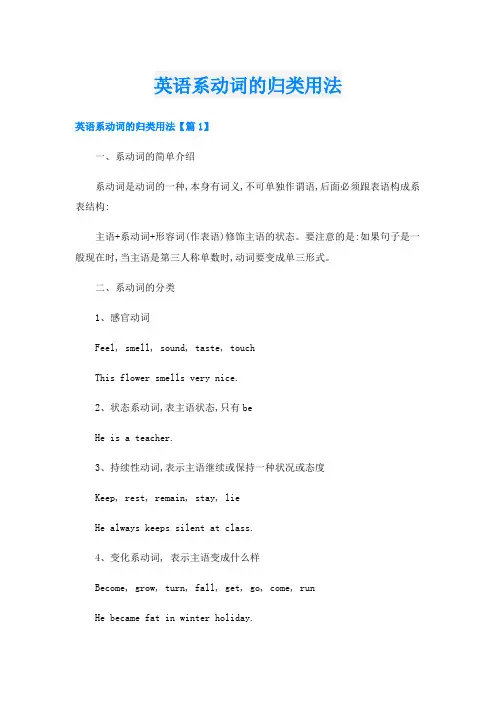
英语系动词的归类用法英语系动词的归类用法【篇1】一、系动词的简单介绍系动词是动词的一种,本身有词义,不可单独作谓语,后面必须跟表语构成系表结构:主语+系动词+形容词(作表语)修饰主语的状态。
要注意的是:如果句子是一般现在时,当主语是第三人称单数时,动词要变成单三形式。
二、系动词的分类1、感官动词Feel, smell, sound, taste, touchThis flower smells very nice.2、状态系动词,表主语状态,只有beHe is a teacher.3、持续性动词,表示主语继续或保持一种状况或态度Keep, rest, remain, stay, lieHe always keeps silent at class.4、变化系动词, 表示主语变成什么样Become, grow, turn, fall, get, go, come, runHe became fat in winter holiday.其实很多系动词可以当系动词,也可以当实义动词,但用法有所不同。
如:LookLook at my hand 实义动词,看She looks amazing.系动词三、下面举例几道题来看Some food isnt good for us, but it good.A. tastesB. eatsC. soundsD. taste解析:根据句意,食物是尝起来,所以用动词taste。
这里主语是it,第三人称单数,所以用tastes,先A.The moon cake tastes▁▁▁▁▁; it sells▁▁▁▁▁.A. good; wellB. good; goodC. well; wellD. well; good解析:taste系动词;sell实义动词。
taste后要加形容词作表语,修饰月饼。
而sell后加副词修饰sell本身。
所以taste +good; sell +well.本题选A.I really enjoy the noodles and vegetables. They ▁▁▁▁▁delicious.A. stayB. feelC. tasteD. sound解析:本题根据句意来。

五类动词:第一类动词:让某人做某事动词结构:let / make / have sb. do sth.E.g. Let’s go! Don’t make me laugh!第二类动词:助动词(顾名思义:帮助你对将肯定的意思变成否定或疑问),如:be , do, have, wille.g. I love you! →变成否定句:I do not love you.变成疑问句:Do I love you?第三类动词:情态动词(常用有5个):can /could, may/might, shall/should, will/would, must/must, dare, have to(不得不,客观必须), ought to(理应去做), need to(需要去做)结构:情态动词+ do sth. (动词原形)注意:情态动词也可作助动词:e.g. I love you.→ I will not love you. Will I love you?第四类动词:感官动词:see/watch/look at, hear/listen to, smell, feel, notice, observe, taste, touch结构:感官动词do sth. (只指向一个动作,并不说明动作的状态)+sb.{doing sth. (表明动作是进行着的状态)★注意:(被动语态时)The boy is seen to sing.类似感官动词结构:①mind/ practice/ regret/ finish/ avoid/ escape + doing sth. (动名词,e.g. mind smoking,practice playing football,etc.)②keep/ continue/ go on+ doing sth. (表明动作是进行着的状态)③stop doing sth. (停止做某事),stop to do sth.( 停下手上的事情去做某事)翻译:停止说话,听老师讲课。
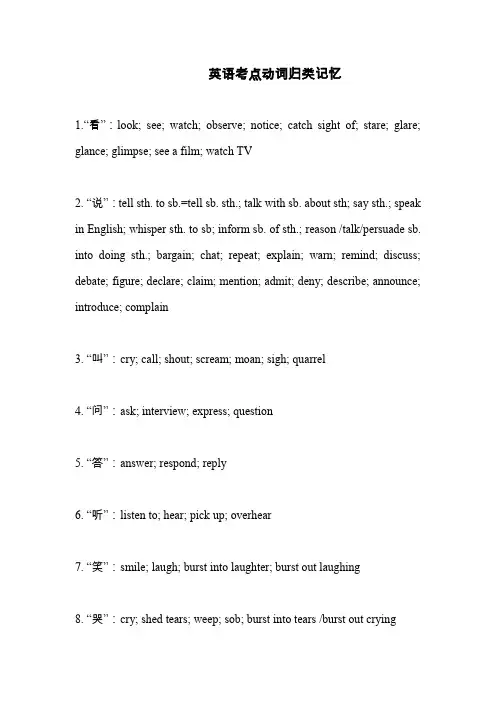
英语考点动词归类记忆1.“看”:look; see; watch; observe; notice; catch sight of; stare; glare; glance; glimpse; see a film; watch TV2. “说”:tell sth. to sb.=tell sb. sth.; talk with sb. about sth; say sth.; speak in English; whisper sth. to sb; inform sb. of sth.; reason /talk/persuade sb. into doing sth.; bargain; chat; repeat; explain; warn; remind; discuss; debate; figure; declare; claim; mention; admit; deny; describe; announce; introduce; complain3. “叫”:cry; call; shout; scream; moan; sigh; quarrel4. “问”:ask; interview; express; question5. “答”:answer; respond; reply6. “听”:listen to; hear; pick up; overhear7. “笑”:smile; laugh; burst into laughter; burst out laughing8. “哭”:cry; shed tears; weep; sob; burst into tears /burst out crying9. “吃/喝”:eat/drink; sip; have a meal; have supper; toast; taste; treat sb. to; help oneself to10. “穿”:put on; wear; have sth. on; be dressed in; make up; get changed; be in red; take off ; remove11. “行”:walk ; run ; climb; jump; skip; slip; come/go; enter; move; drive; ride; fly; crawl12. “坐”:sit down; be seated; seat oneself; take a seat,stand; lean13. “睡/休息”:lie /on one’s back/on one's side/ on one’s stomach; stay in bed; have a rest; take a nap; be asleep; bend; turn over; rest14. “写”:dictate; write sth.; describe; drop a line; draw; take down/write down15. “拿/放”:take; bring; hold; carry; fetch; put; lay; pull; push16. “抓”:take hold of; seize; grasp; scratch17. “打”:hit; beat; strike; blow; attack18. “扔”:throw; drop; fall; wave; shake19. “送”:send; deliver; give; offer; see off20. “摸/抱”:touch; fold; embrace; hug; hold in one’s arms21. “踢/碰”:kick; knock; tip22. “找/查”:find; look for; find out; discover/explore; hunt for; search for; seek, seek for; in search of; search sb.; search sp. for sth.; check; examine; test; inspect23. “得”:get; obtain; acquire; gain; possess24. “失”:lose; be lost /be missing/gone25. “有”:have; own; conquer; occupy;possess26. “无”:nothing left; the remaining thing; disappear; be missing /gone27. “增/减”:rise / go up, drop; raise; bring down /reduce; increase/decrease28. “买/卖”:buy; purchase; afford; pay; pay off ; pay for; sell; on sale; bargain; bill / cheque / cash/ credit card/ notes/ coins; discounts29. “存在/消失”:come into being; exist; appear; survive ; live; show; turn up; disappear; die; die out; pass away; be out of sight30. “变化”:develop; improve ; become; grow; go + bad /wrong/ sour; turn + colour; change /change into; reform31. “成功/失败”:make it; succeed; make progress; come true; realize one’s dream; wi n; lose; fail to do; defeat; suffer loss; beat; turn sth. into reality32. “努力”:try /manage; make efforts; attempt ; do one's best; do as much as one can to do33. 祝贺:congratulate sb. on sth.; celebrate; observe; get together34. 敬佩:admire; respect; show respect for/to; adore35. 赞美/批评:praise; think highly of/ blame sb for sth; sb is to blame; criticize /scold sb. for sth.; have a low opinion of sb; speak ill of36. 喜/恶:like; love; be fond of ; be keen on; be crazy about; adore; be into; prefer; enjoy/ dislike hate; ignore37. 到达:arrive at; reach; return to; get to; stay in sp.; visit; leave; leave for38. 受伤:hurt ; injure; wound; cut; kill; drown; bleed; get burnt; suffer from; suffer a loss39. 损坏:damage; destroy; ruin; break down; crash; be broken40. 修复:repair; rebuild; restore; fix; recover oneself41. “认识的过程” :feel; sense; guess; suppose; wonder; doubt; know /learn, realize, understand, remember; be familiar with; recall; recite; apply to42. 认为;判断:think; believe; consider; find; feel; conclude; infer; doubt43. 想/考虑:think of…as…; think about; consider; think over44. 支持/反对:agree; accept; receive; elect; vote for/ disagree; refuse; turn down; be against; vote against45. 花费:sth./doing sth.+cost; sb.+spend+ (in) doing sth.; sb.+afford +n/to do sth. ; It +takes/took some time/ money/energy to do sth.; sb. pay some money for sth.46. 省/存钱:save /save up; set aside; put away47. 参加:take part in; join /join in; attend; compete in/ for/against48. 控告:accuse sb. of; charge sb. with49. 救治/帮助:help /help out; save /rescue sb from sth.; cure sb. of sth; aid sb in doing sth / to do sth; help sb with sth;assist sb in doing sth50. 逃避:run away; escape from; flee; hide51. 阻止/禁止:prevent / keep/ stop sb. from doing sth.; forbid doing sth.;ban; prohibit52. 对付/处理:handle / do with / deal with /tackle /overcome sth. ; solve; settle53. 效仿:copy; imitate; learn from; learn54. 爆发/发生:come about; happen to; take place; break out; burst out; go off; explode55. 安装/装备:fasten; fix; set; equip; be armed with; be equipped with56. 追求:pursuit; ran after; seek after; chase; catch up with; keep up with57. 建议:advise; suggest; recommend; propose; urge; demand; persuade58. 打算:plan / intend / design to do; be going to do /be about to do /will do59. 似乎/好象:seem; appear; look like;as if /as though60. 开办/关闭:open; start; set up; close/close up; end; close down。
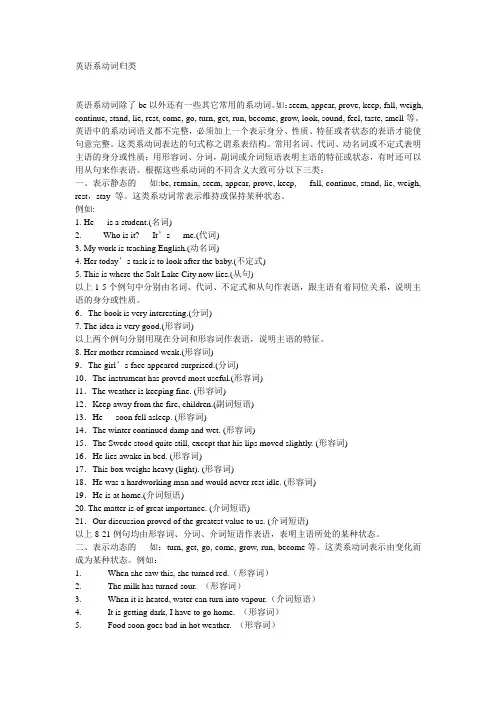
英语系动词归类英语系动词除了be以外还有一些其它常用的系动词。
如:seem, appear, prove, keep, fall, weigh, continue, stand, lie, rest, come, go, turn, get, run, become, grow, look, sound, feel, taste, smell等。
英语中的系动词语义都不完整,必须加上一个表示身分、性质、特征或者状态的表语才能使句意完整。
这类系动词表达的句式称之谓系表结构。
常用名词、代词、动名词或不定式表明主语的身分或性质;用形容词、分词,副词或介词短语表明主语的特征或状态,有时还可以用从句来作表语。
根据这些系动词的不同含义大致可分以下三类:一、表示静态的如:be, remain, seem, appear, prove, keep, fall, continue, stand, lie, weigh, rest,stay 等。
这类系动词常表示维持或保持某种状态。
例如:1. He is a student.(名词)2.--- Who is it? --- It’s me.(代词)3. My work is teaching English.(动名词)4. Her today’s task is to look after the baby.(不定式)5. This is where the Salt Lake City now lies.(从句)以上1-5个例句中分别由名词、代词、不定式和从句作表语,跟主语有着同位关系,说明主语的身分或性质。
6.The book is very interesting.(分词)7. The idea is very good.(形容词)以上两个例句分别用现在分词和形容词作表语,说明主语的特征。
8. Her mother remained weak.(形容词)9.The girl’s face appeared surprised.(分词)10.The instrument has proved most useful.(形容词)11.The weather is keeping fine. (形容词)12.Keep away from the fire, children.(副词短语)13.He soon fell asleep. (形容词)14.The winter continued damp and wet. (形容词)15.The Swede stood quite still, except that his lips moved slightly. (形容词)16.He lies awake in bed. (形容词)17.This box weighs heavy (light). (形容词)18.He was a hardworking man and would never rest idle. (形容词)19.He is at home.(介词短语)20. The matter is of great importance. (介词短语)21.Our discussion proved of the greatest value to us. (介词短语)以上8-21例句均由形容词、分词、介词短语作表语,表明主语所处的某种状态。
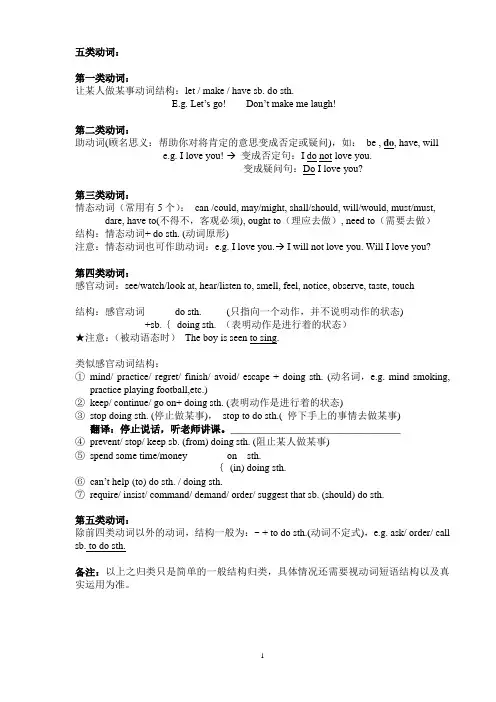
五类动词:第一类动词:让某人做某事动词结构:let / make / have sb. do sth.E.g. Let’s go! Don’t make me laugh!第二类动词:助动词(顾名思义:帮助你对将肯定的意思变成否定或疑问),如:be , do, have, wille.g. I love you! →变成否定句:I do not love you.变成疑问句:Do I love you?第三类动词:情态动词(常用有5个):can /could, may/might, shall/should, will/would, must/must, dare, have to(不得不,客观必须), ought to(理应去做), need to(需要去做)结构:情态动词+ do sth. (动词原形)注意:情态动词也可作助动词:e.g. I love you.→ I will not love you. Will I love you?第四类动词:感官动词:see/watch/look at, hear/listen to, smell, feel, notice, observe, taste, touch结构:感官动词do sth. (只指向一个动作,并不说明动作的状态)+sb.{doing sth. (表明动作是进行着的状态)★注意:(被动语态时)The boy is seen to sing.类似感官动词结构:①mind/ practice/ regret/ finish/ avoid/ escape + doing sth. (动名词,e.g. mind smoking,practice playing football,etc.)②keep/ continue/ go on+ doing sth. (表明动作是进行着的状态)③stop doing sth. (停止做某事),stop to do sth.( 停下手上的事情去做某事)翻译:停止说话,听老师讲课。

(八)动词的分类01 命题趋势 考标导向化近年来对动词的考查主要是动词的种类及各类动词的基本区别,动词的基本变化形式,常见的动词的词义辨析及短语动词的辨析,其中,动词和短语动词的辨析以及动词的基本变化形式是考查的重点和热点。
预计2015年动词考查的趋势将是:在具体的语言环境中考查基础动词及其短语动词的辨析。
02 定义 概念清晰化动词是表示人或事物动作和状态的词。
按照其语法功能,动词分为行为动词、系动词、助动词及情态动词四类。
行为动词又叫实义动词,分为及物动词(后面必须跟宾语意义才完整的动词),不及物动词(本身意义不完整,其后不能接宾语的动词);系动词(不能独立作谓语,必须与表语一起构成谓语);助动词(本身没有词义,不能独立作谓语,只能和别的动词一起构成谓语的词,这类词表示时态、语态、语气等特征,帮助构成否定、疑问等);情态动词(本身有一定意义,但没有人称和数的变化,不能单独使用,必须和实义动词一起构成句子的谓语,表示说话者的情感、态度和语气)。
03 知识归类 知识网络化❶动词的种类分类图解功能及用法 行为动词本身含有实在意义,表示动作或状态,在句中能独立作谓语。
连系动特例清单1.不及物动词要想接宾语,必须在不及物动词后加上适当的介词。
如:The baby is smiling at us.小孩正对着我们笑呢。
He died of hunger.他死于饥饿。
Please listen to the teacher carefully.请仔细听老师讲课。
2.双宾语动词后面跟两个宾语,直接宾语为动词直接涉及的事物;间接宾语往往指涉及的人。
间接宾语有时可放到后面去,由介词to或for引导,变成介词短语。
◆能接以to引导的间接宾语的动词常见的有:bring,give,leave,lend,offer,pass,play,read,send,show,take,teach,tell,write等。
如:Could you lend your dictionary to me?请你把你的字典借我用用好吗?She passed the salt to him.她把盐递给了他。
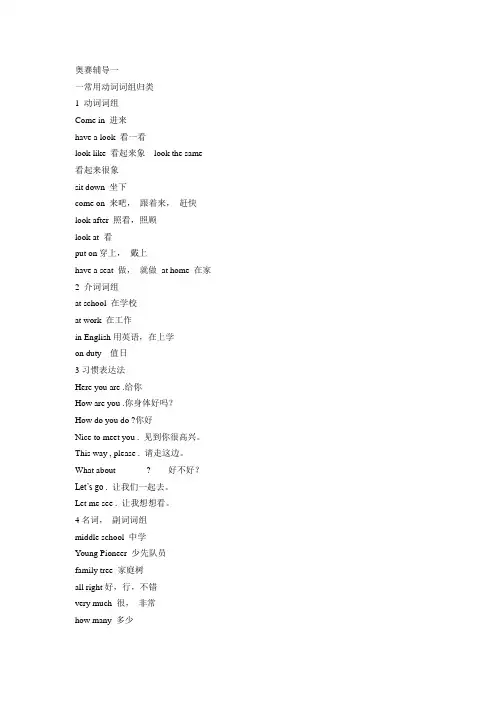
奥赛辅导一一常用动词词组归类1 动词词组Come in 进来have a look 看一看look like 看起来象look the same 看起来很象sit down 坐下come on 来吧,跟着来,赶快look after 照看,照顾look at 看put on穿上,戴上have a seat 做,就做at home 在家2 介词词组at school 在学校at work 在工作in English用英语,在上学on duty 值日3习惯表达法Here you are .给你How are you .你身体好吗?How do you do ?你好Nice to meet you . 见到你很高兴。
This way , please . 请走这边。
What about ----------?------好不好?Let’s go . 让我们一起去。
Let me see . 让我想想看。
4名词,副词词组middle school 中学Young Pioneer 少先队员family tree 家庭树all right好,行,不错very much 很,非常how many 多少over there 在那边(指较远处)5其他常用表达法Thanks a lot 多谢.Excuse me .劳驾That’s all right .不用谢。
That’s right . 好的,对。
You are welcome . 不用谢Welcome to China .欢迎来中国。
What class (grade , row ) are you in ?你在哪个班(年级,排)?What’s five plus (minus) two ? 五加(减)二是多少?How old are you ?你多大了?How many --------?多少?Is everyone here ? 都到齐了吗?Do you know ?你知道吗?Sorry , I don’t know . 对不起,我不知道。
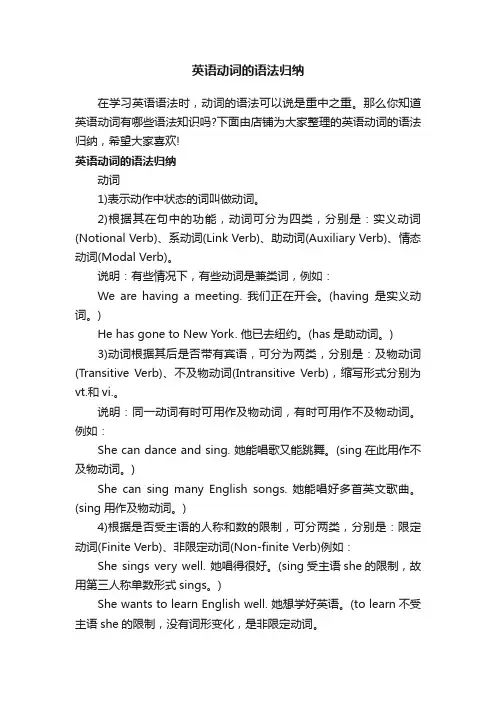
英语动词的语法归纳在学习英语语法时,动词的语法可以说是重中之重。
那么你知道英语动词有哪些语法知识吗?下面由店铺为大家整理的英语动词的语法归纳,希望大家喜欢!英语动词的语法归纳动词1)表示动作中状态的词叫做动词。
2)根据其在句中的功能,动词可分为四类,分别是:实义动词(Notional Verb)、系动词(Link Verb)、助动词(Auxiliary Verb)、情态动词(Modal Verb)。
说明:有些情况下,有些动词是兼类词,例如:We are having a meeting. 我们正在开会。
(having是实义动词。
)He has gone to New York. 他已去纽约。
(has是助动词。
)3)动词根据其后是否带有宾语,可分为两类,分别是:及物动词(Transitive Verb)、不及物动词(Intransitive Verb),缩写形式分别为vt.和vi.。
说明:同一动词有时可用作及物动词,有时可用作不及物动词。
例如:She can dance and sing. 她能唱歌又能跳舞。
(sing在此用作不及物动词。
)She can sing many English songs. 她能唱好多首英文歌曲。
(sing用作及物动词。
)4)根据是否受主语的人称和数的限制,可分两类,分别是:限定动词(Finite Verb)、非限定动词(Non-finite Verb)例如:She sings very well. 她唱得很好。
(sing受主语she的限制,故用第三人称单数形式sings。
)She wants to learn English well. 她想学好英语。
(to learn不受主语she的限制,没有词形变化,是非限定动词。
说明:英语中共有三种非限定动词,分别是:动词不定式(Infinitive)、动名词(Gerund)、分词(Participle)。
5)根据动词的组成形式,可分为三类,分别是:单字词(One-Word Verb)、短语动词(Phrasal Verb)、动词短语(Verbal Phrase)例如:The English language contains many phrasal verbs and verbal phrases. 英语里有许多短语动词和动词短语。
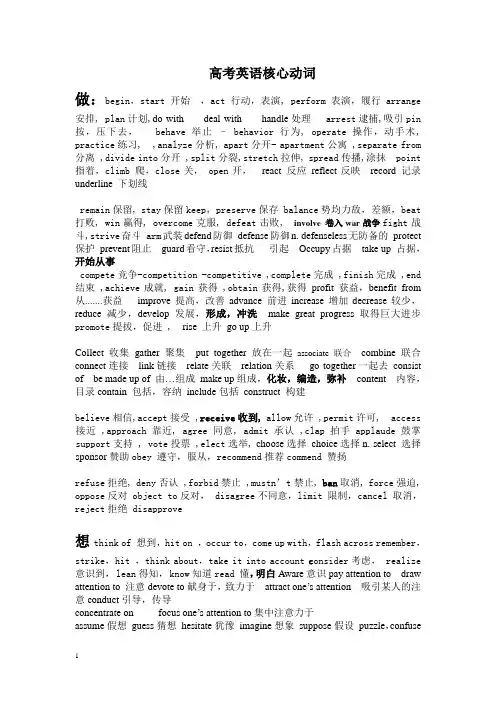
高考英语核心动词做:begin,start开始,act行动,表演, perform表演,履行 arrange安排, plan计划,do with deal with handle处理 arrest逮捕,吸引pin 按,压下去, behave举止– behavior行为, operate操作,动手术, practice练习, ,analyze分析, apart分开- apartment公寓 ,separate from 分离 ,divide into分开 ,split分裂,stretch拉伸, spread传播,涂抹 point 指着,climb 爬,close关, open开,react 反应reflect反映record 记录underline 下划线remain保留, stay保留keep,preserve保存 balance势均力敌,差额,beat 打败, win赢得, overcome克服, defeat击败, involve 卷入war战争fight战斗,strive奋斗 arm武装defend防御defense防御n. defenseless无防备的protect 保护prevent阻止guard看守,resist抵抗引起Occupy占据take up 占据,开始从事compete竞争-competition -competitive ,complete完成 ,finish完成 ,end 结束 ,achieve成就, gain获得 ,obtain获得,获得profit 获益,benefit from 从.......获益improve提高,改善advance 前进increase增加decrease较少,reduce 减少,develop发展,形成,冲洗make great progress取得巨大进步promote提拔,促进 , rise 上升go up上升Collect收集gather聚集put together放在一起associate 联合combine联合connect连接link链接relate关联relation关系go together一起去consist of be made up of 由…组成make up组成,化妆,编造,弥补content 内容,目录contain 包括,容纳include包括construct 构建believe相信,accept接受 ,receive收到,allow允许 ,permit许可, access 接近 ,approach靠近, agree同意, admit承认 ,clap 拍手applaude 鼓掌support支持 , vote投票 ,elect选举, choose选择choice选择n. select 选择sponsor赞助obey 遵守,服从,recommend推荐commend 赞扬refuse拒绝, deny否认 ,forbid禁止 ,mustn’t禁止, ban取消, force强迫, oppose反对 object to反对, disagree不同意,limit 限制,cancel 取消,reject拒绝 disapprove想think of 想到,hit on ,occur to,come up with,flash across remember,strike,hit ,think about,take it into account c onsider考虑, realize 意识到, lean得知, know知道read 懂,明白Aware意识pay attention to draw attention to 注意devote to献身于,致力于attract one’s attention 吸引某人的注意conduct引导,传导concentrate on focus one’s attention to集中注意力于assume假想guess猜想hesitate犹豫imagine想象suppose假设puzzle,confuse使…迷惑consider考虑doubt 怀疑wonder 想知道,wander漫游regard 认为,insure确保certain特定的sure当然,确定convince确信make sure确保secure 使安全confirm确认decide决定,断定determine决定mean to 打算做try to 尽力做attempt to企图做intend to打算做manage to设法做成trust信任believe 相信Indicate指出show 表明infer conclude推断Admire 钦佩,羡慕envy嫉妒respect尊敬-aspect 方面desire 渴望eager 渴望的hope 希望expect期望wish希望show mercy to have mercy on sb 同情influence affect 影响refer to参考,指的是liberate解放感觉.sense 感觉look看起来smell闻起来taste 尝起来sound听起来feel 摸起来touch 触摸,感动生活:shake 摇头nod 点头droop,hang低垂(头)wave 挥手rock摇晃roll滚stamp跺脚smile 微笑,laugh大笑,hate恨,讨厌,kiss吻,please取悦,cry哭tear撕,眼泪,hide藏,掩藏,insert插入,switch切换,watch TV看电视plant 植树,speed 超速travel 旅游,lift举起,电梯,drop 落下,drip 滴落,shut闭dress 穿wear ,try on,have on be in imitate 模仿belong to属于,exit 出去,bar 阻挡,enter 进去,exist 存在live 活,居住,depend 依靠,control 控制,Pull拉push推pump泵水pour倾倒Look out watch out be careful come on take care小心matter,mind,care about,take care of care for look after照顾concerns about 关心care about在意adopt 收养、采纳Sweep扫地tidy弄整洁make the bed整理床铺wipe擦洗clean弄干净clear 清理sleep 睡,wind上发条,缠绕,风breathe 呼吸,cough 咳嗽,wake 醒来,fold折叠,bathe洗澡comb梳,wash洗,brush刷,shave 刮(胡子),sink下沉,水槽,exercise锻炼,bend弯腰,致力于,拐弯,press压,starve饿, drink渴,cut切,mix混合,bake烘烤, steam蒸,fry 炸,boil煮,dissolve溶解,melt融化 eat吃, swallow 吞,咽, digest,消化, feed 喂,tie 栓,系,reserve预定, treat款待,对待,治疗cure治愈, recover恢复健康, serve 服务(及物), order点菜,set放置, place 放置,cheers干杯raise 养活,筹集资金提高,feed喂养bring up 抚养hire雇佣,短租,rent长租save 节省,保存,挽救rescue 营救depend on rely on-依靠依赖divorce离婚marry 结婚engage订婚fade褪色,sew 缝(衣服)iron熨烫,swing 摇晃,wear 穿,戴,面带(表情),mess弄乱bear 生孩子,熊,忍受,负担,结果实name 命名show展示,display陈列fasten弄牢固fix安装修理repair修理mend 修补工作:share分享,共用spare腾出,业余的,备用的,waste 浪费,guide 引导,graduate毕业,shape塑造,形状,fail失败,succeed 成功,welcome 欢迎,make a difference ,count much,matter 很重要,make no difference,count little,it doesn't matter 不重要,treasure珍视,value 珍惜evaluate估价weigh权衡worth 值,deserve 值得,该受,exploit 剥削,利用,make use of 利用,make the most of 充分利用,smooth消除困难,光滑的,set up,found 建立,speed 速度,超速 fine 罚款,occupy employ pursue engage 忙于spell 拼写,Paint 涂颜料,park 停车,edit 编辑design设计describe 描写Adapt 改编,company 公司陪伴,print 打印,contribute 贡献,devote to 致力于,store 储存,add添加multiply乘minus减divide除Work out算出,健身measure测量figure out考虑出figure人物,体型,数字,图画,影子 revise修订master掌握learn 学习grasp紧抓,掌握Attend ,present 参加,出席take part in 参加join加入join in参加organize组织Aid 帮助assist帮助help 帮助assistant助手rank排等级match fit suit score 打分sign标牌,做标记-signal 信号mark 打分,做标记delay put off 推迟cancel call off ,取消cause ,bring about 引起说ask问,question质问,beg乞求 ,tell a lie撒谎 ,(ie lied lied 撒谎,lie lay lain 躺lying lay laid laid 下蛋,放置,laying )boast 吹牛cheat,take in 欺骗 , joke开玩笑 ,trick开玩笑,laugh at嘲笑 , warn 警告 sigh叹息,mourn默哀apply申请 ,interview面试,采访 , announce 宣布 , declare宣布, inform 通知 ,answer回答, reply回复, respond回应 apologize道歉,excuse原谅 ,forgive原谅 pardon宽恕,再说一遍speak说,say说话,tell告诉,区分distinguish 区分compare 比较contrast 对比,comment评论, remark评论, communicate交流,chat聊天,talk谈论 ,greet 问候,打招呼, comfort安慰, pronounce发音, introduce介绍, invite邀请, promise承诺,预示,promising有前途的 praise表扬,pray祈祷 ,foretell预告, predict预测 ,forecast预告, remind提醒 ,shout大声喊叫,cry大喊let out 说出,发出 whisper悄悄话,murmur低声说,嘀咕whistle打口哨,repeat重复,mention 提及encourage鼓励,inspire鼓舞interpret口译, (translate笔译) address演讲,地址deliver递送,发表演讲,stress强调,persuade 说服,voice说出 volunteer 志愿,encourage 鼓励, report报道,appreciate感激,欣赏 cheer 欢呼,干杯, read 读,明白shout 大声喊叫,scream尖叫 ,express表达,(press压impress给。
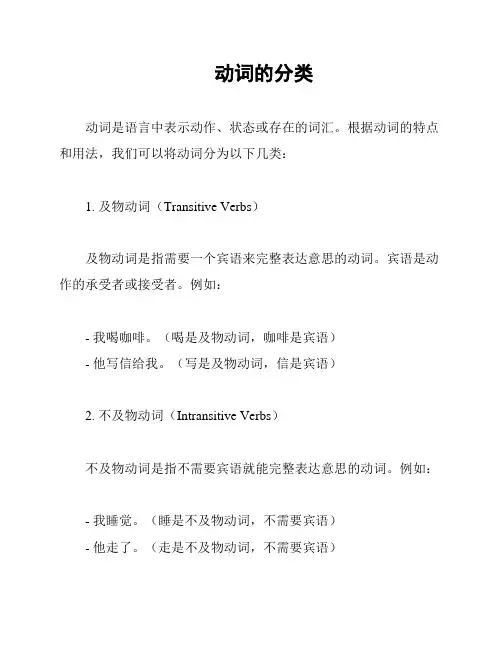
动词的分类动词是语言中表示动作、状态或存在的词汇。
根据动词的特点和用法,我们可以将动词分为以下几类:1. 及物动词(Transitive Verbs)及物动词是指需要一个宾语来完整表达意思的动词。
宾语是动作的承受者或接受者。
例如:- 我喝咖啡。
(喝是及物动词,咖啡是宾语)- 他写信给我。
(写是及物动词,信是宾语)2. 不及物动词(Intransitive Verbs)不及物动词是指不需要宾语就能完整表达意思的动词。
例如:- 我睡觉。
(睡是不及物动词,不需要宾语)- 他走了。
(走是不及物动词,不需要宾语)3. 连系动词(Linking Verbs)连系动词是用来连接主语和表语的动词。
表语是主语的状态、性质、特征的名称或形容词。
连系动词本身没有意义,只起到连接作用。
例如:- 她是医生。
(是是连系动词,医生是表语)- 这个花很漂亮。
(很漂亮是连系动词,花是表语)4. 助动词(Auxiliary Verbs)助动词是用来帮助主动词或表达其它意义的动词。
助动词通常和主动词一起使用,形成各种时态、语气、语态等。
例如:- 他正在吃饭。
(正在是助动词,吃是主动词)- 我已经完成了作业。
(已经是助动词,完成是主动词)5. 情态动词(Modal Verbs)情态动词是一类特殊的辅助动词,用来表示说话者对某种动作、状态或可能性的态度、命令、请求等。
情态动词没有人称和数的变化。
例如:- 我可以去吗?(可以是情态动词,表示允许)- 你应该努力研究。
(应该是情态动词,表示义务)以上就是动词的分类。
了解动词的分类有助于我们更好地理解和运用语言。
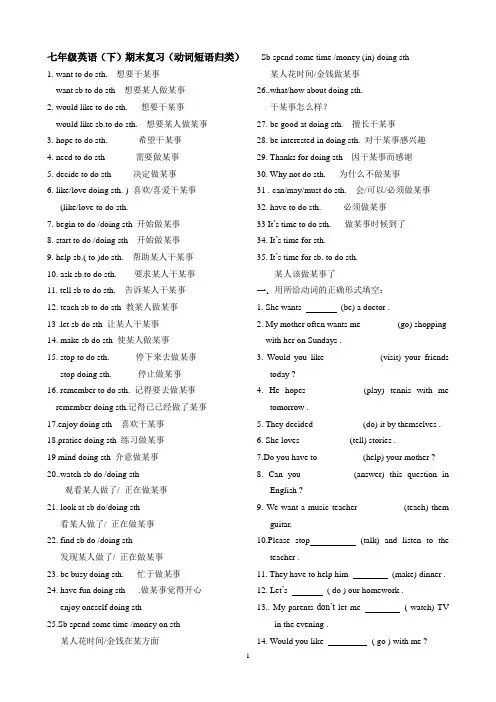
七年级英语(下)期末复习(动词短语归类)1. want to do sth. 想要干某事want sb to do sth 想要某人做某事2. would like to do sth. 想要干某事would like sb.to do sth. 想要某人做某事3. hope to do sth. 希望干某事4. need to do sth 需要做某事5. decide to do sth 决定做某事6. like/love doing sth. ) 喜欢/喜爱干某事(like/love to do sth.7. begin to do /doing sth 开始做某事8. start to do /doing sth 开始做某事9. help sb.( to )do sth. 帮助某人干某事10. ask sb.to do sth. 要求某人干某事11. tell sb to do sth. 告诉某人干某事12. teach sb to do sth 教某人做某事13 .let sb do sth 让某人干某事14. make sb do sth 使某人做某事15. stop to do sth. 停下来去做某事stop doing sth. 停止做某事16. remember to do sth. 记得要去做某事remember doing sth.记得已已经做了某事17.enjoy doing sth 喜欢干某事18.pratice doing sth 练习做某事19 mind doing sth 介意做某事20..watch sb do /doing sth观看某人做了/ 正在做某事21. look at sb do/doing sth看某人做了/ 正在做某事22. find sb do /doing sth发现某人做了/ 正在做某事23. be busy doing sth. 忙于做某事24. have fun doing sth .做某事觉得开心enjoy oneself doing sth25.Sb spend some time /money on sth某人花时间/金钱在某方面Sb spend some time /money (in) doing sth某人花时间/金钱做某事26..what/how about doing sth.干某事怎么样?27. be good at doing sth. 擅长干某事28. be interested in doing sth. 对干某事感兴趣29. Thanks for doing sth 因干某事而感谢30. Why not do sth. 为什么不做某事31 . can/may/must do sth. 会/可以/必须做某事32. have to do sth. 必须做某事33 It’s time to do sth. 做某事时候到了34. It’s time for sth.35. It’s time for sb. to do sth.某人该做某事了一.用所给动词的正确形式填空:1. She wants (be) a doctor .2. My mother often wants me ________(go) shopping with her on Sundays .3. Would you like ____________(visit) your friendstoday ?4. He hopes ____________(play) tennis with metomorrow .5. They decided ___________(do) it by themselves .6. She loves ___________(tell) stories .7.Do you have to __________(help) your mother ?8. Can you ___________(answer) this question inEnglish ?9. We want a music teacher __________(teach) themguitar.10.Please stop (talk) and listen to theteacher .11. They have to help him (make) dinner .12. Let’s ( do ) our homework .13.. My parents don’t let me ( watch) TVin the evening .14. Would you like __ ( go ) with me ?15. Remember ( close) the door whenyou go out .16.My English teacher often helps me________(learn)English17. Remember ( close) the door whenyou go out18. His mother often makes him ____________(do)his homework at home .19.Everyone in our class enjoys _________(listen) tomusic.20. She practice _____________(play) the pianoevery day.21..How about ( go ) to the mountains .22..Does she like ( play) basketball ?23.Thank you for ( give ) us so much help .24.They had lots of fun ( swim) in theriver .25.I often watch a boy ( play) soccer on theplaygeound .26.They are busy ( study) for the exam .27.Why not ( go ) out for a walk .28. Are you interested in ( play) ping-pong ?29.It’s time for us ( clean) our classroom .30.He spends an hour __________(do) his homework every day .31. It usually takes him half an hour __________(go)to school on foot时态专练一般现在时用所给的动词的正确形式填空:1. He often (have) dinner at home.2. Daniel and Tommy (be) in Class One.3. We (not watch) TV on Mondays.4. Nick (not go) to the zoo on Sundays.5. they (like) the World Cup(世界杯)?6. What they often (do) on Saturdays?7. your mother (read) newspapers every day?8. The girl _ (teach) us English on Sundays.9. She and I (take) a walk in the park every evening.10. There (be) some water in the bottle.11. Mike (like) cooking.12. They (have) the same(相同的)hobby.13. He (study) at No. 3 Middle School .14. Y ou always (do) your homework well.16. She (go) to school from Monday to Friday.17. Liu Tao (not do) like PE.18. The child often (watch) TV in theevening.20. --What day (be) it today?--It’s Saturday21. Tom ( look ) like his mother.现在进行时用所给的动词的正确形式填空:1. The boy _____________ (draw) a picture now.2. Listen .Some girls _________ (sing) in the classroom.3. My mother ______________ (cook) some nice food now.4. What ________ you ________ (do) now?5. Look, they ____________ (have) an English lesson.6. They _____________(not play) basketball now.7. Look, the girls _________ (dance) in the classroom.8. --What is our granddaughter doing?--She______________(listen) to music.9. It’s5 o’clock now. We __ __________ ____ (have) supper now10. --_________Helen__________(wash )clothes?--Yes, she is.11.The cats ______ (run) in the garden now.12. --- __ you ______ (listen) to music ?---Yes , I am13. Look ,the students ___________ ( swim ) atthe pool .14. --- ____ Lucy and Lily _______ ( clean )their room ?---Y es , they are .15. I __________ ( talk ) on the phone now .一般过去式写出下列动词的过去式1. am / is2. are3.have,has4. write5.see6. make7.sit 8.go9.begin 10.read11.run 12.tell13. get 14.sing15. spend 16. say17. come 18.swim19.know 20.take21. think 22. bring23. buy 24. .leave_______25. eat 26. teach27.do 28. .find29. give 30. put31. feel 32. . eat33. .send 34. fight35speak用所给的动词的正确形式填空1.Tom and Mary _______ (come) to China lastmonth.2. Mike ___________(not go) to bed by 10 o’clock last night.. So he ______ (get ) up late.3. Mary _________ (read) English yesterday morning.4. There _______ (be) 3,800 students in our school last year .5. I ___________ (call) Mike this morning.7. Tom __________ (begin) to learn Chinese last year.9. My mother ________________ (not do) housework yesterday.10. She watches TV every evening. But she_________ (not watch) TV last night.11.________ your father ________ ( go ) to work every day last year?12.--What time _______ you _______ (get) to Beijing yesterday?-- We __________ (get) to Beijing at 9:00 in the evening.13. What __________ (make) him cry (哭) just now?14. --When _______ you _________ (come) to China? --Last year.15. she ________ (have) supper at homelast night ?16. Jack ____________ (not clean) the room just now.17. _________ (be) it cold in your city yesterday?18. How many people ___________ (be) there in yourclass last term(学期)?19. It ________ (be) hot yesterday and most children_______ (be) outside.20. There _______(be) a football match on TVyesterday evening, but I _________ (have) no time to watch it.综合练习一、用所给的词的适当形式填空(10分)1.The students___________(be) from Shanghai.2. I enjoy _______________(listen) to the popmusic(流行音乐) very much.3. He ____________(not live) in Paris.4. Do you like ___________(write)?5. Can you _________(say) it in English?6. Li Lei wants ___________(make) friends with Jim.7. Please __________(write) to your parents soon.9. __ he __________(know) a little English ?10.__________ (swim) is my favourite sport.11.he supermarket is on the ___ (five) A venue.12.There are two ____ (library)in our school.13.Let’s read from the ___ (begin) of this book.14.They have fun _____________ (walk) in the park.15.Why not ________(take)a taxi to go home?16.The koalaslike________(eat)__________(leaf)17.My father often __________ (work) very long hours.18.. Listen! Joan __________(sing) in the classroom.She often __________ (sing) there19. they (watch) TV now?20.Look!Tom and John (swim).21.I saw two __________(thief) in the mall.22.The bike is ________(you). _______(I) is overthere.23. Tom wants to be an _________(act).24. I want to work with__________(he).25. The news __________(be) very good.26. His work is __________(excite) but kind of___________(danger).27. What ____________(language) does he speak?28. Where are their pen ________(pal) from?29. .He went to many ________( country) last yea30. Miss Zhang teaches ______( we ) English .31. ________(thief ) don’t like police .32. This is the _________ (begin) of the garden tour.33. Y ou will have to pass __________(eight) A venue.34..Let ______ (I) tell you something about our street.35.It often ______(rain ) in spring.It __________( rain ) outside now .36. We are ______________( surprise ) that the little boy can speak English so well .37. My sister wants to be a __________ ( police ) .Shethinks it’s interesting .38. They are playing games . They are very____________( relax ).39. Thank you for ____________( help ) us so much .40 .The weather is quite ___________( wind ) in Jinan in winter .41. Look ! Everyone _________ ( have ) a good time .42.Please write and tell me about __________( you ) .43.Can you help the boy with __________( swim) ?44. A good ____________( begin) makes a goodending .45. There _________(be) a teacher and some studentsin the classroom46.Dolphins are very___________(friend) to animals .47.The ________(one)day of the week is Sunday .48..They are good ___________(music)and we alllike them.49Tom and his parents _________ ( watch ) TV now . 50______ you often ___________(walk ) to school ? 二.根据汉语和首字母完成单词(15分,每空1分)1.Jack is near________ old ____________(一个旧旅馆)。
特殊用法动词归类复习1、宾语动名词类:finish, practice, resist(抵制), consider, suggest, imagine, enjoy, appreciate(欣赏,感激), miss (想念), mind, admit, avoid(避免), delay(延误), deny(否认), stand(承受), risk(冒险), quit(放弃), understand, fancy(想象), succeed, insist on, be busy, be worth, ,keep on, be\get used to, 习惯于,= be accustomed to, can’t help n\V-ing忍不住, can’t help but V 只得…,can’t help to V帮不上忙,feel like.简记口诀:完成实践值得忙,(finish, practice, be worth , be busy )考虑建议不禁想,(consider, suggest, can’t help, feel like)继续习惯别放弃,(keep on, be accustomed\used to, give up)喜欢思念想介意. (enjoy\appreciate, miss, want\need\require V-ing\ to be V-ed, mind)want \ need \require V-ing或to be v-edThe flowers need watering= The flowers need to be watered2、V+ to (p.p介词)——N \ V-ingGet down to, be used\accustomed to stick to, object to, pay attention to, owe to, thanks to, due to, be addicted to, devote to, look forward to, contribute to, lead to3、V+ to dorefuse, learn, agree, help, hope, wish, decide, tend, intend, volunteer, seek, afford, determine, expect, manage, offer, pretend, promise, fail, long(渴望),arrange for sb to v, attempt, desire, happen, plan4、宾语“两面派”forget, try, remember, mean, go on, stop, continue, like, begin, start(V-ing持续动作,发生过的事情,to V瞬间动作,将要做的事情)5、宾补不定式ask, advise, get, allow, permit, recommend, warn sb to do*advise, allow, permit, forbid V-ing6、不带宾补类hope, suggest, demand, insist不接sb to do,可接从句hope that sb can v, suggest, insist, demand that sb should do7、宾补分词类(感官、使役)catch, find, see, hear, let, make ,have sb do(一般主动)\ V-ing(主动进行)\ V-ed(被动)8、“需要被”want\need \require V-ing \to be V-ed9、DISCO动词demand, insist, suggest, command, order, want, require, recommend, desire, urge, arrange 接宾语从句sb should VIt is DISCOed that sb should VDISCO同源名词接表语从句、同位语从句sb should V10、否定转移,反义问句看从句I don’t think\guess\ believe\expect that clause.I don’t think he is honest, is he?理解*I don’t love a women because she is beautiful.Life is not valuable because it is long.11、避免重复接替代词so\not类think, believe, expect, seem, appear, hope, guess, suppose-He is kidding you.- I don’t think so12、性质、特点类。
英语单词词性分类:将动作归类一. 动词(Verb)动词是描述动作或状态的词汇。
它们用来表达一个人、物或事情所做的动作或所处的状态。
下面是一些常见的动词分类:1. 行为动词(Action Verbs):描述具体的动作或行为,例如:run(跑)、dance(跳舞)、eat(吃)等。
2. 状态动词(State Verbs):描述存在状态或条件的动作,一般不表示具体的动作,例如:be(是)、seem(似乎)、like(喜欢)等。
3. 情态动词(Modal Verbs):表示可能性、能力、意愿等,例如:can(能)、may(可能)、must(必须)等。
二. 动名词(Gerund)动名词是以-ing结尾的动词形式,可以作为名词使用。
它们表示一种具体的动作或状态。
例如:swimming(游泳)、running(跑步)、reading(阅读)等。
三. 分词(Participle)分词是动词的一种形式,用来表示动作进行中或已经完成。
常见的分词形式有:1. 现在分词(Present Participle):以-ing结尾,用于表示进行中的动作或状态,例如:running(正在跑)、swimming(正在游泳)等。
2. 过去分词(Past Participle):常以-ed、-en、-t等形式结尾,用于表示已完成的动作或状态,例如:written(已写)、broken (已破碎)等。
四. 不定式(Infinitive)不定式是动词的一种形式,一般以to加上动词原形构成。
不定式可以作为名词、形容词或副词使用。
例如:to run(跑步)、to eat(吃饭)、to learn(研究)等。
以上是一些常见的英语动词词性分类及其说明。
希望对您有帮助!。
小学常用动词过去式归类Document serial number【NL89WT-NY98YT-NC8CB-NNUUT-NUT108】小学常用动词过去式归类cut?-cutput?-put?let?-letread-readbring?-brought?build-builtbuy?-boughtcatch?-caught? find?-foundget-got?forget?-forgot?have(has)-had?keep?-keptunderstand?-understood?sit?-sat?blow-blew learn?-leartmake-mademeet?-metsay-saidsend?-sentsleep?-sleptspend-spentstand?-stoodteach-taughttell?-toldthink?-thought?is(am)-wasare?-were?break?-brokego-went?ring-rang?see-saw?wear?-woredo?-did?ride?–rodedraw?-drew?grow-grew?know?-knew drink?-drankwrite?–wrotegive-gavespeak–spokefly?-flew sit?-sat?run-ran?drive?-drove?eat-ate?swim-swam?take-took?throw-threwwake-woke?begin?-beganhear?-heardfeel?-felt不规则动词的过去式大体上归纳有以下六条记忆法:1.以t结尾的词,过去式与原形相同。
如:put—put,let—let,cut—cut,beat—beat2.以d结尾的词,把d变成t。
如:build—built,lend—lent,send—sent,spend—spent3.以n结尾的词,在词后加t。
动词复习1.接动词原形(do sth.)情态动词can , could, may, must, needhad better, why not, have to, let’s, would rather, Will ( Would ) you please…?make, let ,have(sb. do sth.)2.接动词不定式(to do)begin, start, hope, decide, wish, learn, teach, plan, take, discuss, know, refuse, hope,order, offer, lend,enough, need, would like, it’s time to do,make up one’s mind to do, have something to do, It’s +形容词+(for /of sb.) to do something,疑问词后(when/how/ what/why/where to… )get(allow,want,ask,encourage,tell,warn,invite…) sb to do sth;3.接动名词doingfinish, enjoy, mind, keep, prevent, spend, practice, hate, admit,suggest,feel like, be busy, there be, do some…,go doing, be used to, can’t help, prefer…to…,look forward to doing, thank sb. for doing sth, excuse sb. for doing sth, have fun doing,介词:at, in , on, of , from, for, about, with, without,4. 同时接to do/doingsee(listen to,hear,watch,notice…) sb do/doing sth;remember, forget, try, stop, like,love,固定搭配look after(at,for,up,like,out, forward to)put on(out,up,off)turn on(down, up, off, into, out, over…)go on(out,over, to…)hand in(out,over,down…)take off (after, up, out…)come from/on/true/to an endget back/on/off/along with/to/up/into the habit oftake away/off/out/up书面表达中的过渡用语:①表示时间顺序:above all,at first, secondly,thirdly,then, later,finally,recently, in the end,as soon as, After a while,little by little…,on one hand, on the other hand.②表示空间顺序:near, next to, far from, in front of, on the left, on one side…③表示转折关系:but, yet, however ,though…④表示因果关系:thanks to,so, because, for, therefore, thus…⑤表示目的: in order to(that), so as to, so that…⑥表示列举:for example, such as…⑦表示总结性:in all, in a word, in short…⑧表示观点:As for me,in my opinion, in my eyes, I think, I’m sure…⑨表示并列关系:What’s more, in addition, as well, besides,moreover,likewise,furthermore…。
动词及短语归类知识总结为了更好地进行动词及短语的归类,我们可以先从其语法特征出发,将其分为以下几类:1. 动词组动词组特征:由两个或多个动词构成,一般出现在句子谓语部分,构成复合谓语。
例子:I have been studying English for two years.2. 及物动词及物动词特征:需要一个直接宾语,表示动作的施加对象。
例子:She baked a delicious cake for the party.3. 不及物动词不及物动词特征:不需要宾语,可以单独构成句子谓语部分。
例子:He slept soundly on the comfortable bed.4. 动词 + 副词动词 + 副词特征:副词可以修饰动词,表示程度、位置、方式等。
例子:She sings beautifully in the choir.5. 动词 + 介词短语动词 + 介词短语特征:介词短语可以表示动作的方向、位置、时间等。
例子:We are waiting for the bus at the bus station.6. 动词 + 宾语 + 介词短语动词 + 宾语 + 介词短语特征:宾语可以是名词、代词、不定式等,介词短语表示宾语的位置、时间、方向等。
例子:He sent a letter to his friend in Japan.7. 动词 + 形容词动词 + 形容词特征:形容词可以表示动作的结果、状态、性质等。
例子:The flowers smell fragrant in the garden.8. 动词 + 名词动词 + 名词特征:名词可以表示动作的对象、结果等,还可以表示动作本身。
例子:He opened the door and walked into the room.9. 动词 + 不定式动词 + 不定式特征:不定式可以表示目的、结果、原因等。
例子:She wants to learn how to play the piano.10. 动词 + 分词动词 + 分词特征:分词可以表示动作的状态、结果、原因等。